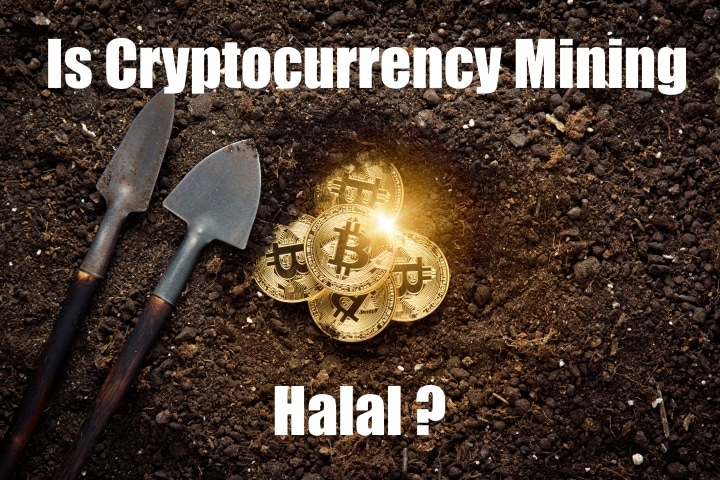Is Cryptocurrency Mining Halal? UPDATE
In 2017 I wrote a blog post called, Is Bitcoin Mining Halal or Haram?, and we came to the conclusion that at that time there was no consensus among scholars about whether mining Bitcoin is halal or haram. Rather, we stated that Bitcoin mining is halal because there was no obvious evidence to suggest that mining Bitcoin is haram.
However, years later, this question is still being asked by many so I figure it’s time for an update.
Is cryptocurrency mining halal or is Bitcoin mining halal? The simple answer is, yes. Bitcoin mining is halal. Bitcoin mining is nothing more than the act of verifying transactions on the Bitcoin blockchain by a Proof of Work protocol. Bitcoin miners who successfully verify transactions are providing a service to Bitcoin users as well as providing security to the Bitcoin network and they are rewarded Bitcoin for their effort and there is nothing haram with this.
Great! You have an answer to your question. But now you must be thinking, but what about those who say Bitcoin is haram and in addition to that also say, or imply, that Bitcoin mining is haram?
If this is your thought process, then please read on.
Is mining crypto haram?
In my previous blog post, Is Bitcoin Halal? 10 Scholars’ Opinion on Bitcoin, I noted that some scholars have said that all aspects of cryptocurrency are haram and this includes mining Bitcoin.
Two of the main reasons some scholars have said that crypto mining is haram are:
- Bitcoin (or any cryptocurrency for that matter) is not backed by a government; therefore, all aspects of Bitcoin, including mining bitcoin, is haram since there is no government approval.
- Bitcoin mining is resource intensive and uses too much energy which in turn is bad for the environemnt; therefore, Bitcoin mining is haram.
But how accurate are these two reasons as to why some scholars would rule Bitcoin mining as haram and can we say that the above-mentioned reasons are, reasonable?
Bitcoin backed by government
For those scholars who say that all aspects of Bitcoin are haram because Bitcoin has no government backing, they mean that governments do not recognize Bitcoin as currency, money, or legal tender; therefore, Bitcoin, and this includes Bitcoin mining, would be seen as haram.
However, over the past 10 years since Bitcoin has been around, more and more governments have changed or updated their laws allowing their citizens to participate in crypto markets with governments recognizing Bitcoin as either a currency, an asset, or even property.
2021 has also marked the first time that a country’s government has not only allowed the permissibility of Bitcoin use for its citizens, but it is the first time that a government has also recognized Bitcoin as legal tender. In other words, we finally have Bitcoin backed by a government.
In June of 2021, President Nayib Bukele of El Salvador made history by passing a bill in the Salvadorian congress making it a law approving Bitcoin to be used as legal tender.
This now begs the question, since Bitcoin is backed by a government, El Salvador, is it then halal for Muslims in El Salvador to use Bitcoin? It seems that the answer would be, yes.
And what about mining Bitcoin? El Salvador has not only recognized Bitcoin as legal tender but the government will launch a Bitcoin mining initiative for the country as well. We’ll touch on that later in this blog post.
Now, are we saying that all countries recognize Bitcoin as legal tender or all countries approve the use of Bitcoin – and this includes Bitcoin mining – of course not. We know that China has just recently banned Bitcoin mining in their country.
Update: China has now banned ALL cryptocurrency activities.
Regardless of this, we are observing a growing acceptance by governments worldwide to explore the use of cryptocurrencies in their countries and/or allow their citizens to use cryptocurrencies even when there are no clear laws or guidelines in place or even if the government does not implement a law stating that Bitcoin is legal tender.
Bitcoin energy consumption
Another argument made by some scholars as to why Bitcoin mining is haram is because it is commonly stated that Bitcoin mining electricity consumption utilizes large amounts of energy to mine transactions and is therefore bad for the environment.
This has also been mentioned by our sheikh, Assim Al Hakeen, and I have touched on this in a blog post called, 10 Reasons Why Bitcoin is Haram. Sheikh Assim Al Hakeem Bitcoin Fatwa.
I have also been of the mindset that Bitcoin mining is resource-intensive and uses a high amount of energy to mine Bitcoin. However, the question that I failed to ask myself was, Bitcoin mining is resource-intensive compared to what?
When comparing Bitcoin mining to the energy consumption of the banking and gold industry, two industries that Bitcoin is regularly compared with, then we begin to see a different story.
Galaxy Digital has released a report called, On Bitcoin’s Energy Consumption: A Quantitative Approach to a Subjective Question, which states that Bitcoin mining uses less than half the energy of what is used in the banking or gold industry.
The chart below shows that the banking industry uses around 263.72 TWh per year and the gold industry uses about 240.61 TWh per year and Bitcoin uses less than half the energy of both of these industries, 113.89 TWh per year.

So, is Bitcoin mining resource-intensive? Does Bitcoin mining use a lot of energy? The answer is, yes. But so are other industries that are a mainstay of human life – the banking and gold industry. As we stated, annually, they both consume more energy than Bitcoin.
So if the argument is that Bitcoin mining is haram because it is resource-intensive and not environmentally friendly, then the same argument must be made for the banking and gold industries.
So what are possible solutions? Are there alternatives as to how we can mine or verify Bitcoin and cryptocurrency transactions in a manner that is environmentally friendly?
The answer to that is, yes. We are now seeing cryptocurrencies such as Cardano, Dash, and Ethereum already utilize or plan to move to a Proof of Stake (PoS) protocol which utilizes less energy consumption than a Proof of Work (PoW) protocol.
Cardano claims that their PoS protocol utilizes 6 gigawatt-hours of energy annually which is far less than Bitcoin. Now, will we see Bitcoin move to a PoS protocol? I doubt it, as many Bitcoin advocates hold the belief that Proof of Work is the most robust and secure way to secure the network and do not want to see that change, but it could be that future cryptocurrencies will put their focus on PoS rather than PoW to address environmental concerns.
In addition to moving to Proof of Stake, another solution would be to utilize renewable or clean energy for mining cryptocurrencies.
Remember how we noted that El Salvador has also launched a Bitcoin mining initiative? Well, the El Salvadorian government is planning to utilize their geothermal resources, volcanic energy, to mine Bitcoin thus making Bitcoin mining environmentally friendly by utilizing renewable and clean energy.
So, do we finally have Bitcoin that is backed by a government? Yes.
Do we have Bitcoin being mined by clean energy or do we have cryptocurrencies moving to a more environmentally friendly way of verifying transactions by protocols such as Proof of Stake? Again, yes.
Since this is the case, then I foresee scholars changing their opinions on their ruling of Bitcoin and not making such blanket statements.
Muslim countries and cryptocurrency mining
Now you may be saying, well, that all sounds great for El Salvador, but what about Muslims in Muslim countries? Is cryptocurrency mining halal in Muslim countries?
Well, I have another blog post called, Muslim Countries Where Bitcoin Is Legal Or Illegal, where you will not only see a list of Muslim countries and their legal stance on Bitcoin but you will also see that some of the countries highlight cryptocurrency mining initiatives that are underway in their respected countries.
Pakistan is one of those countries. Pakistan has launched a cryptocurrency mining initiative for the province of Khyber Pakhtunkhwa to build Bitcoin mining farms with the hopes of opening up their mining farms to investors in the future.
Kazakhstan has also been taking lead in the Muslim world when it comes to having government-backed cryptocurrency mining initiatives and has already produced a number of cryptocurrency mining farms.
In an article by Aizhan Abilgazina, A New Kind of Mining: Kazakhstan Stakes Its Claim in the Cryptocurrency Industry, Aizhan states,
Kazakhstan has seen a significant growth in cryptocurrency mining activities with around $200 million having been already invested in 13 mining farms that are operational around the country with four more under construction.
By Aizhan Abilgazina
The Kazakhstan government also has plans to actively seek outside investors who are seeking cryptocurrency mining in their country.
Last month, Kazakhstan’s minister of digital development, innovation and aerospace industry, Askar Zhumagaliyev, announced that the department is planning to attract 300 billion tenge, or $738 million, worth of investments by 2023 for activities related to cryptocurrency mining.
Source – Asia Times
The only downside I see to cryptocurrency mining in Kazakhstan is that half of their energy consumption comes from coal and coal tends to be considered as “dirty energy”.
Conclusion
Again, we are seeing an evolution as to how governments, more specifically, Muslim governments, are interacting with cryptocurrency and the blanket argument that Bitcoin does not have government backing and therefore Bitcoin mining is haram does match realities on the ground.
And in all fairness, many of the scholars who said that Bitcoin and Bitcoin mining is haram had declared such opinions years ago. Times change, new information becomes available, and it may be that these scholars have also changed their opinion.
We have come a long way since Bitcoin and cryptocurrency hit the world stage over 10 years ago and as our overall understanding and education of cryptocurrency has evolved, so has the opinion of our scholars.
So, is Bitcoin mining halal? According to a number of scholars, yes. You are providing a service and being compensated for that service. The only thing you must do now is to check your government’s legal rulings on cryptocurrency.
And in the end, Allah knows best.
PLEASE KINDLY SHARE THIS ARTICLE IF YOU’VE FOUND BENEFIT IN IT



